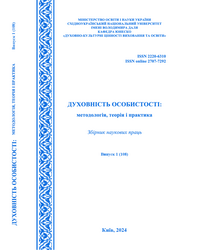THE ROLE OF SELF-REGULATION IN FORMING A SUCCESSFUL CAREER: PSYCHOLOGICAL STRATEGIES AND INTERNAL MECHANISMS
DOI:
https://doi.org/10.33216/2220-6310/2024-108-1-85-98Keywords:
professional career, success, mental health, emotional self-regulation, psychological strategies, internal mechanismsAbstract
The article "The Role of Self-regulation in the Formation of a Successful Career: Psychological Strategies and Internal Mechanisms" is devoted to studying the critical role of self-regulation in the career growth process. We have explored the psychological strategies and internal mechanisms that help individuals achieve success in the professional sphere. The article highlights the concept of self-regulation, its importance and its impact on career achievement, providing essential insights for career psychology practitioners and researchers. Self-regulation is the process of managing one's mental state and personality, including goals, principles, life path and various types of activity, such as cognitive, professional activity and communication. In the context of our research, we investigated self-regulation of mental states as a component of general self-regulation, which affects the body and personality through external and internal factors and interaction with the physical and social environment. Therefore, self-regulation of mental states is a critical element of management and activity adjustment, considering the subject's emotional state. The conclusions of this scientific study indicate the importance of self-regulation in the context of various aspects of life and professional careers. Developing this skill can contribute to success and job satisfaction. The study results indicate that self-regulation of mental states is defined as the process of managing mental processes and the individual's internal state. The analysis showed that this skill allows us to effectively manage the activity, considering the emotional state. The research highlights the importance of understanding and supporting mental health and successful careers. This work can serve as a basis for developing strategies for improving self-regulation in crises and when performing complex professional tasks. An additional direction of further research can be a combination of qualitative and quantitative methods to obtain a comprehensive understanding of the self-regulation of mental states in employee crises.

